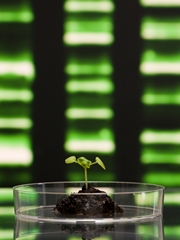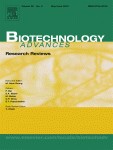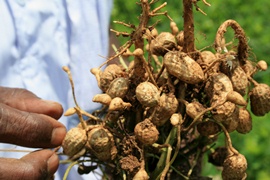Digital revolutionaries of the agricultural world, unite!
- Published Date
 GCP and comrades far and wide, join us in celebrating a highly successful man of science, who is most certainly in a class of his own!
GCP and comrades far and wide, join us in celebrating a highly successful man of science, who is most certainly in a class of his own!
Early July witnessed a momentous day for GCP’s Comparative Genomics leader, Rajeev K Varshney, as he met with Bill Gates and associates at a brainstorming session in Seattle, USA, where discussions centred on a digital revolution in agriculture.
Rajeev presented his own specialist ‘manifesto’ on Genomics and informatics for digitalisation of crop breeding, also discussing how to deploy GCP’s Integrated Breeding Platform and crop ontology work as ‘arms’ for the ongoing fight for global food security. He was in the company of 10 external experts and selected officials from the Bill & Melinda Gates Foundation.
But why not hear this story in all its full and living colour directly from our source? An excerpt from Rajeev’s Chronicles can be found in the GCP Blog.
Conservation & plant genetic resources research: the 2013 Vavilov-Frankel Fellowship call from Bioversity now open
- Published Date
 Two fellowships from Bioversity International’s Vavilov-Frankel Fellowship Fund are currently available to carry out research on a wide range of topics related to the conservation and use of plant genetic resources in developing countries. Each fellowship, supported by Pioneer Hi-Bred International Inc, USA and the Grains Research and Development Corporation (GRDC), Australia, offers up to USD 20,000 for research lasting 3–12 months during 2013.
Two fellowships from Bioversity International’s Vavilov-Frankel Fellowship Fund are currently available to carry out research on a wide range of topics related to the conservation and use of plant genetic resources in developing countries. Each fellowship, supported by Pioneer Hi-Bred International Inc, USA and the Grains Research and Development Corporation (GRDC), Australia, offers up to USD 20,000 for research lasting 3–12 months during 2013.
Applications may be submitted in English, French or Spanish to This email address is being protected from spambots. You need JavaScript enabled to view it. before the deadline on 11 November 2012.
Further particulars about the call, application form and guidelines can be downloaded from the Bioversity website.
Now on board: GCP welcomes new members to the Executive Board
- Published Date
GCP is pleased to announce the addition of two new members to its Executive Board.
Dr Michael Morris and Dr Markus Palenberg came on board in March 2012, shortly before joining the team for the 8th Executive Board Meeting, from March 28-29 at GCP HQ in El Batan, Mexico. They bring with them an extensive portfolio of expertise ranging from agricultural strategy to evaluation methodology and capacity building.
Dr Morris is currently a Programme Coordinator in the Agriculture and Rural Development Unit (AFTAR) of the World Bank, where he manages work on agriculture and rural development throughout Sub-Saharan Africa. He has extensive experience as scientist, researcher, and manager, and has worked in more than 40 developing countries throughout his career. His areas of expertise include agricultural strategy and policy formulation, farm-level productivity enhancement, marketing systems and value chain development, agricultural research and technology transfer, institutional strengthening, and capacity building.
Dr Palenberg is managing director of the Institute for Development Strategy (IfDS), an independent research institute in Munich, Germany, where he carries out multiple roles as researcher, evaluator and advisor. His research focus is on evaluation methodology, whilst his evaluation specialisation is on theory-based evaluations of global programmes and public-private development partnerships. He also advises programmes and networks on impact strategies, internal governance arrangements and M&E systems. In addition, he is a member of the Programme Management Team of HarvestPlus, GCP's sister Challenge Programme.
Welcome to GCP's Executive Board!
To view their full profiles, visit the Executive Board page.
Charting a change at the summit: A new Chair for the Executive Board
- Published Date
 Effective 1st July 2012, GCP’s Executive Board Chair is Dr Andrew Bennett, who has been an enthusiastic and active Board member since its foundation in 2008, contributing to Board decision-making and providing advice based on his vast experience which spans expertise in agronomy, tropical agriculture, forestry, research, environmental management, international development, negotiation and governance.
Effective 1st July 2012, GCP’s Executive Board Chair is Dr Andrew Bennett, who has been an enthusiastic and active Board member since its foundation in 2008, contributing to Board decision-making and providing advice based on his vast experience which spans expertise in agronomy, tropical agriculture, forestry, research, environmental management, international development, negotiation and governance.
Dr Bennett strongly supports the Board’s focus: GCP’s science and people, and always enjoys connecting with GCP’s wide range of scientists and partners at General Research Meetings, which he sees as a great knowledge forum to drive forward the role played by science in development.
In addition to his new role as Executive Board Chair, he is also President of the Tropical Agricultural Association, UK, chairs the SciDev.Net Board, and previously chaired the CIFOR Board. He was formerly Executive Director of the Syngenta Foundation and Director of Rural Livelihoods and Environment at the Department for International Development (DFID, UK).
Dr Bennett succeeds Prof Cal Qualset as Board Chair: Prof Qualset had been at the helm since the Board was established in 2008. In this time, he successfully steered the fully independent Board around several challenges, including the streamlining of GCP in its tricky ‘transition’ area of the chart. We thank Prof Qualset for captaining the Board and for continuing to use his specialist knowledge of plant genetics, breeding, variety development, genetic resources, distributions, and landraces of cereal crops. Prof Qualset will continue to serve as Board member.
Related links
- VIDEO: Andrew traces GCP from its founding to the present time
- The GCP community, its labour and joys (blogpost: learn more about Andrew Bennett, and his views on GCP and the Executive Board
- Executive Board
Genomic advances caught in the Arachis web raise hopes of cracking the groundnut genome: GCP projects and other initiatives illustrated in prominent article
- Published Date
A recent article by a crack team of genomic experts, including several GCP researchers and GCP's Leader for Theme 1 (Comparative and applied genomics), Rajeev Varshney, has been published in the scientific journal Biotechnology Advances Vol 30, Issue 3.
 The article, entitled Advances in Arachis genomics for peanut improvement is based on work done in Objective 1 of GCP's Tropical Legumes I project plus through other initiatives, and recounts how – with the aid of advanced molecular biology (molecular markers, genetic and physical maps, generation of expressed sequence tags, etc) – the groundnut genomic research community has been tackling the challenging age-old problems associated with groundnut genomics and its architecture.
The article, entitled Advances in Arachis genomics for peanut improvement is based on work done in Objective 1 of GCP's Tropical Legumes I project plus through other initiatives, and recounts how – with the aid of advanced molecular biology (molecular markers, genetic and physical maps, generation of expressed sequence tags, etc) – the groundnut genomic research community has been tackling the challenging age-old problems associated with groundnut genomics and its architecture.
The article narrates the team's accomplishments as they wrestle to clear the bottleneck of low genetic diversity to pave way for the genetic improvement of groundnuts, and squabble with the wider family when reluctant (and quite possibly grumpy!) wild relatives with mixed ‘street credentials' are invited to the groundnut gathering, amongst other feats.
In a pea-nutshell, the hope of cracking the genome of this tough nut (whose ‘street' name is groundnuts or peanuts depending on where you are in the planet) is expected just around the corner.


